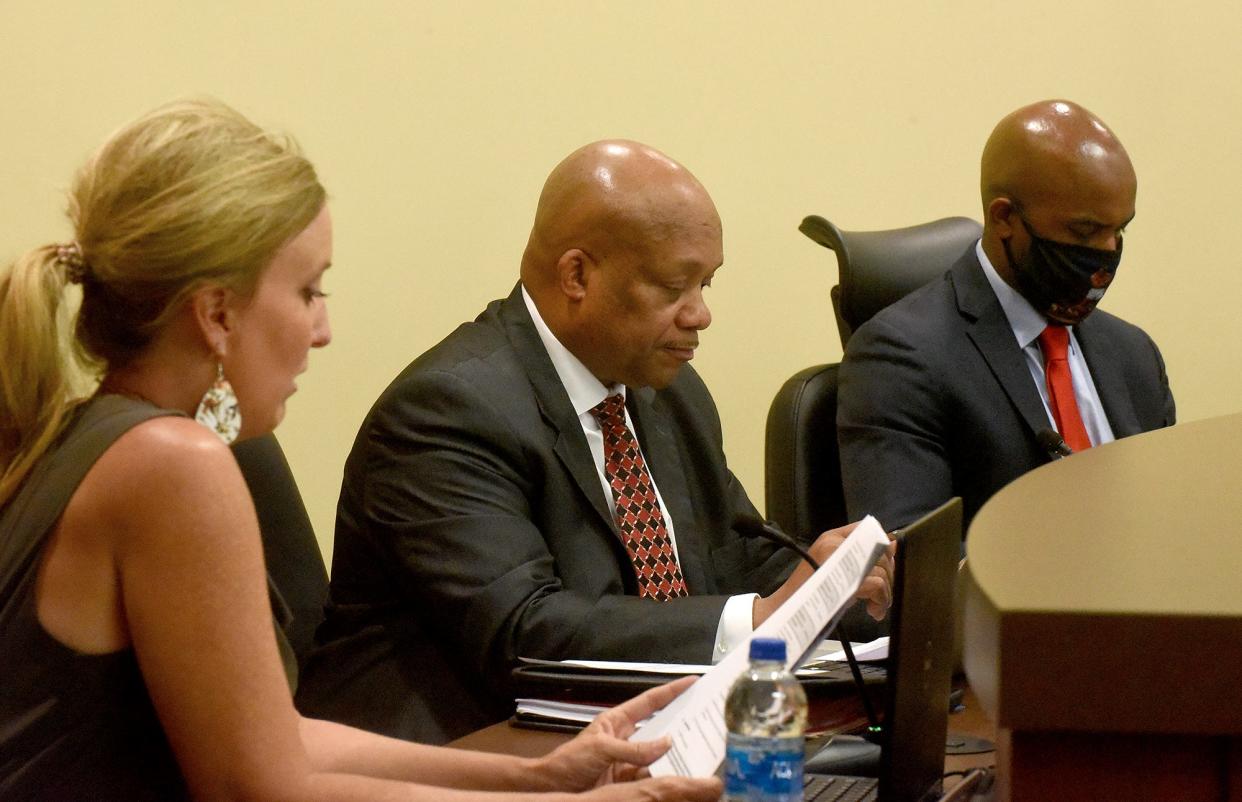What holds back student achievement in Columbia Public Schools? School board reviews data

Columbia Public Schools Superintendent Brian Yearwood on Wednesday talked with the school board about student achievement, what's holding it back and what can be done to improve it.
Yearwood was assisted by members of his cabinet: Helen Porter, assistant superintendent for secondary education; De'Vion Moore, assistant superintendent for elementary education; Carla London, chief equity officer; and Dave Wilson, director of assessment, intervention and data.
Students lagging in every area were Blacks, Pacific Islanders, students qualifying for free or reduced-price meals and students on special education plans.
"This year we're continuing our mantra of putting scholars first in everything we do," Yearwood said.
Student attendance
Student attendance was 68% in 2021-22, down from 89% in 2020-21. The 68% figure means 68% of students were at school at least 90% of school days.
"Something that impacts us tremendously is our attendance," Yearwood said. "If our scholars aren't in school, we can't teach them."
Yearwood's plan is to reinstate attendance letters to parents, when their child misses five days, 10 days and 15 days.
Counselors will work with middle school and high school students to create intervention plans.
Educators will make positive calls home, to encourage parents to help get their children back in school, Yearwood said.
Another idea Yearwood put forward is attendance competitions at elementary schools.
"Not good," Yearwood said of the attendance numbers. "It was not a good statistic."
Out-of-school suspensions
The 1,156 out-of-school suspensions represent another problem the district needs to address, Yearwood said. Black students received them disproportionately.
He suggested continued equity training for teachers and administrators.
A behavior education plan has just been implemented to outline for administrators steps they can take before considering suspending students, London said.
More:Black students still disproportionally suspended in Columbia Public Schools
Yearwood also discussed increasing the number of behavior support specialists in schools.
Mental health resources for students include those from Family Access Center of Excellence, Burrell Behavioral Health and Compass Health.
"A priority for us in Columbia Public Schools is educating the whole child," London said.
"We do not want our scholars suspended," Yearwood said. "We need to knock those numbers down."
Graduation rate
The high school graduation rate for all students was 89% in 2021-22, but it was 81% for Black students, 75% for students with special education plans and 80% for students qualifying for free or reduced-price meals.
Efforts should increase to follow up with students no longer attending school, Porter said.
"We're getting them back in school," Porter said. "We're kind of hunting those scholars down and figuring out how we can help them."
Obstacles preventing students from completing credit courses need review, she said.
Another recommendation is looking at work-study programs to ensure they count for credit.
MAP scores
Preliminary Missouri Assessment Program scores for CPS in 2021-22 show 43% of all students were proficient or advanced in communication arts. The number for math is 35%.
The scores aren't reflective of what happens in high school, where students consistently surpass state and national averages on the ACT college preparation test, Moore said.
There's a lack of motivation on the MAP tests, he said.
"Students aren't motivated," Moore said. "We know they have no skin in the game."
There were "slight celebrations" among the MAP scores, Moore said.
"Our IEP students, they're growing," he said of students with special education plans.
Targeted interventions, including individualized interventions, are needed for some students to help them catch up with peers.
Wilson and Moore were enthusiastic about the iReady assessments being used in schools for math and communication, when asked about it by school board member Suzette Waters.
It allows schools to identify areas of strength and weakness in the subjects, they said.
"It has a focus on standards," Moore said of the assessment.
Root cause of obstacles
Board member Chris Horn asked about the root causes of the student achievement obstacles.
"COVID," Yearwood said.
Diving into the data will reveal more specific issues, he said.
"It is not a quick fix," Yearwood said. "That's the intent, to get to the root cause and fix it."
The next steps include gathering input and information that will be used to create a draft plan. The first opportunity for the community to provide input is 6-8 p.m. Oct. 6 at Stoney Creek Hotel and Conference Center, where the district will conduct what it calls a World Cafe.
"We have our World Cafe," Yearwood said. "We're going to get input."
The draft plan will be presented in November, with a final plan presented for school board approval in December, Yearwood said.
Roger McKinney is the education reporter for the Tribune. You can reach him at rmckinney@columbiatribune or 573-815-1719. He's on Twitter at @rmckinney9.
This article originally appeared on Columbia Daily Tribune: Yearwood, cabinet present student data to school board, plan in works

